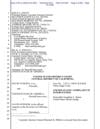Justice Department accuses California of racial gerrymandering in redistricting plan
National News

Audio By Carbonatix
5:30 PM on Thursday, November 13
Brett Rowland
(The Center Square) – The U.S. Department of Justice sued California officials Thursday over the state's redistricting plan, which could help Democrats pick up additional seats in Congress.
The outcome of the legal battle could determine which party controls the U.S. House in 2026, highlighting the political significance of a nationwide scramble for redistricting ahead of the midterm elections.
The Justice Department joined the suit, alleging the plan requires racially gerrymandered congressional districts in violation of the Equal Protection Clause of the 14th Amendment.
California voters approved Proposition 50 by a wide margin earlier this month. The proposition amends the state's constitution to allow the legislature to draw a new congressional district map. The goal of redrawing the boundaries is to give Democrats an advantage that could give the party five more seats in the House. California Gov. Gavin Newsom said the plan was a response to redistricting in Texas that's designed to give Republicans five more House seats.
The Justice Department alleged the California map used race as a factor to help Hispanic voters. The suit asks a judge to prohibit California from using the new map in future elections.
"California's redistricting scheme is a brazen power grab that tramples on civil rights and mocks the democratic process," Attorney General Pamela Bondi said. "Governor Newsom's attempt to entrench one-party rule and silence millions of Californians will not stand."
Newsom said the legal challenge won't succeed.
"These losers lost at the ballot box and soon they will also lose in court," the governor's press office wrote in a post on X after the DOJ filed suit.
The Justice Department filed a motion to intervene in Tangipa et al v Newsom, a case pending before the U.S. District Court for the Central District of California. That's the suit Republicans, including state Assemblymember David Tangipa, R-Fresno, filed against the state. Tangipa spoke out against the redistricting plan as a member of the Assembly Elections Committee.
"The race-based gerrymandered maps passed by the California legislature are unlawful and unconstitutional," said First Assistant U.S. Attorney Bill Essayli of the Central District of California. "The U.S. Department of Justice is moving swiftly to prevent these illegal maps from tainting our upcoming elections. California is free to draw congressional maps, but they may not be drawn based on race."
In California, the state's Citizens Redistricting Commission typically draws congressional boundaries after the release of the U.S. Census every decade. California's Prop. 50, the only statewide measure on the Nov. 4 ballot, passed with 64.1% of the vote, giving the state's Democratic supermajorities the privilege.
The lawsuit comes amid a race for partisan advantage nationwide. States are gearing up to deliver more votes for their favored political parties in a rare, mid-decade overhaul of voting maps that could frustrate voters ahead of the 2026 midterms.
President Donald Trump led calls for Texas to redraw its congressional map in July. Texas Republicans bluntly said the process was aimed at increasing their party's power in Washington. Blue states, including California, have pushed back with their own redistricting. Politicians used to save battles over political boundaries for a once-a-decade update from the U.S. Census Bureau. However, that's not the case this year.
Trump kicked off a recent wave of state-level redistricting, which hasn't been seen since the post-Civil War era.
The Republican-controlled Texas legislature passed the party's new congressional maps in August and sparked a nationwide scramble over redistricting. In states across the country, Democratic and Republican governors are working to increase their party's votes at the federal level.
While some states, like Ohio, had to redraw political boundaries due to a 2018 constitutional amendment, most states, including Texas, California, Florida, Missouri, Illinois, Indiana, New York, New Jersey, and Maryland, are doing so voluntarily.
A poll commissioned by Common Cause and conducted by Noble Predictive Insights found that voters don't like it. The poll found 51% of Republicans, 70% of Democrats, and 60% of independents oppose allowing political parties to engage in mid-decade redistricting. Those numbers moved even higher when the redistricting was done by one party, as The Center Square previously reported.







